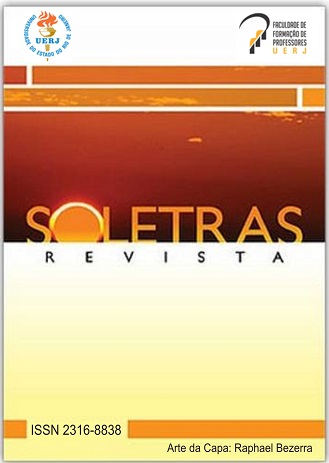A voz e a vez dos podcasts na educação linguística em espanhol
DOI:
https://doi.org/10.12957/soletras.2023.80090Palavras-chave:
Tecnologias digitais, Oralidade, Formação de professoresResumo
O presente artigo objetiva discutir as potencialidades do gênero discursivo podcast na educação linguística, especialmente, em língua espanhola. A metodologia utilizada é a de pesquisa qualitativa-interpretativista, proposta por Stake (2011), com perfil bibliográfico. Kenski (2003) e Moran et al. (2012) corroboram com a ideia de que as tecnologias transformaram também o contexto educacional. Dessa forma, trazemos parte da história das tecnologias voltadas para a educação, ancoradas sobretudo em Paiva (2015). Na sequência, expomos elementos caracterizadores do gênero discursivo podcast, segundo Carvalho, Aguiar e Maciel (2009), Medeiros (2006) e Villarta-Neder e Ferreira (2020). Discorremos também como o podcast pode contribuir para a escuta e a produção oral em língua adicional. Por fim, apresentamos uma proposta de atividades com o uso de podcast em língua espanhola para a educação básica. Como material autêntico, de fácil acesso, abordando temáticas atuais, avaliamos que esse arquivo de áudio pode contribuir significativamente para o desenvolvimento da escuta e da fala em língua adicional, a depender de como o docente explore-o em sala de aula.
Downloads
Publicado
Edição
Seção
Licença
A aprovação dos artigos implica a cessão imediata e sem ônus dos direitos de publicação nesta revista. O(s) autor(es) autoriza(m) ao Programa de Pós-graduação em Letras e Linguística (PPLIN) a reproduzi-lo e publicá-lo na revista SOLETRAS, entendendo-se os termos “reprodução” e “publicação” conforme definição do artigo 5° da Lei 9610/98. O(s) autor(es) continuará(rão) a ter os direitos autorais para publicações posteriores. O artigo poderá ser acessado pela rede mundial de computadores (http://www.e-publicacoes.uerj.br/index.php/soletras), sendo permitidas, a título gratuito, a consulta e a reprodução de exemplar do artigo para uso próprio de quem o consulta. Casos de plágio ou quaisquer ilegalidades nos textos apresentados são de inteira responsabilidade de seus autores.



